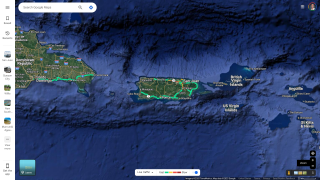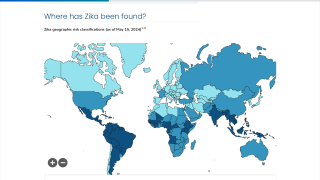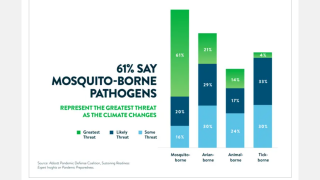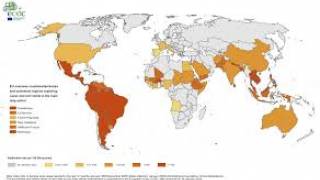Florida Monitoring 23 Pregnant Women with Zika

The State of Florida Health Department’s weekly arbovirus surveillance report says ‘23 pregnant women are being monitored for Travel-Associated Zika Fever Cases in 2019.’
This is important news since the Zika virus has been found to negatively impact the health of an unborn child.
A recent study found pregnant women who become infected with Zika early in pregnancy were 17 times more likely to deliver a baby suffering from a rare neurological condition called Microcephaly, and other negative health conditions.
Unfortunately, there are no vaccines to prevent or medicines to treat the Zika virus today, says the Centers for Disease Control and Prevention (CDC).
The Florida Arbovirus Surveillance Week #40 report published on October 5, 2019, says the Zika virus has been reported in 36 individuals with travel history to a country or area experiencing Zika virus activity during 2019.
This new Florida report indicates the countries of origin for these Zika cases were Brazil, Colombia (1), Cuba (6), Guatemala (5), Haiti (11), Honduras (4), Jamaica, Nicaragua, Philippines, Puerto Rico, and Venezuela (3).
The specific Florida counties reporting travel-related Zika cases during 2019 are as follows:
- Broward (5)
- Collier (3)
- Duval
- Hillsborough (2)
- Indian River
- Lee
- Miami-Dade (17)
- Orange (4)
- Palm Beach
- Sarasota
There are (3) Zika cases in non-Florida residents.
From a global perspective, a total of 87 countries and territories have confirmed evidence of autochthonous mosquito-borne transmission of the Zika virus to the World Health Organization.
During February 2019, the CDC said ‘we do not have accurate information on the current level of risk in specific areas. The large outbreak in the USA is over, but Zika is and will continue to be a potential risk in many countries in the Americas and around the world.
Recently, the Pan American Health Organization said there have been 4,299 Zika virus cases confirmed in the Americas during 2019, with Brazil (3,322) and Peru (829) reporting the most cases.
Zika primarily spreads through infected mosquito bites. You can also get Zika through sex without a condom with someone infected by Zika, even if that person does not have symptoms of Zika.
Anyone who has not already been infected with the Zika virus can get it.
Furthermore, the CDC says pregnant women should not travel to areas with a Zika outbreak, as indicated by red on the Zika ‘map’.
And, if you do decide to visit these Zika endemic areas, pregnant women and couples considering pregnancy should talk with their healthcare provider and carefully consider risks and possible consequences of travel say the CDC.
A recent study regarding condom use in Puerto Rico found only 25 percent of women were using protection in 2016, even though the CDC strongly encourages condom use in Zika endemic areas.
If you have traveled to an area with risk of Zika or had sex with a partner who lived in or traveled to one of these areas, the CDC says you should be tested if you have symptoms of Zika or if an ultrasound shows that your fetus has abnormalities that might be related to Zika infection.
But, routine testing is not recommended for pregnant women exposed to these areas who do not have symptoms. However, your doctor may offer testing based on your individual situation, says the CDC.
As of October 4, 2019, Zika-related Travel Alerts have been issued by the CDC, the Canadian and the UK governments for various countries. As an example, recent Travel Alerts indicate Zika in Thailand has become endemic.
Recent Zika virus news
- Travel-Related Zika Cases Increased in the USA
- 2nd Generation Zika Vaccine Receives $5.4 Million Dollars Funding
- UK Travelers Avoided the Zika Virus
- Zika Arrives in Israel Again
Various Zika vaccine candidates, such as Takeda's TAK-426, remain in clinical studies. But these vaccines will take more development and testing time before they become available to the public.
Vaccine news published by Zika News
Our Trust Standards: Medical Advisory Committee
























